The march of time renews the commitment we made to a special needs community 25 years ago. We vowed to dream big and never give up until there were effective treatments available and eventually a cure for Fragile X syndrome, the most commonly inherited cause of intellectual disabilities and autism.
Read moredrug repurposing
Two-Med Combo Normalized Behavior, Improved Memory in Fragile X Mice

Treating Fragile X syndrome will likely require a combination of drugs, as a single medication may not address all symptoms. At FRAXA-DVI, Dr. Patricia Cogram and her team recently tested a combination of two investigational new drugs in Fragile X mice, with support from Healx. Together ibudilast and gaboxadol rescued a wide array of symptoms in the mice.
Read morePioneering Community-Based Drug Development for Fragile X Syndrome
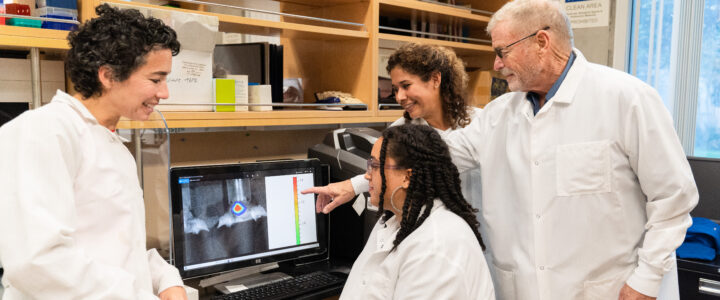
Discover how FRAXA leverages Community-Based Drug Development to create impactful therapies for Fragile X syndrome. Join us as we reshape the future of rare disease treatment.
Read moreComing Together for Rare Disease Day 2023

Today, February 28, we mark Rare Disease Day, a day dedicated to raising awareness about rare diseases and highlighting the need for continued research and collaboration. At FRAXA Research Foundation, we are committed to advancing research on Fragile X syndrome, one of the most common rare diseases worldwide.
Read moreTargeting Serotonin 1A Receptors in Fmr1 Knockout Mice
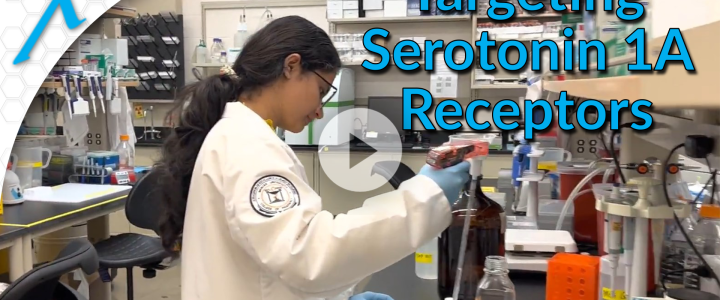
Dr. Canal has discovered a promising treatment approach for Fragile X syndrome: new compounds which specifically and potently boost serotonin in the brain. The target is the brain’s serotonin 1A receptor.
Read moreRepurposing FDA-Approved Drugs to Treat Major Depressive Disorder in Fragile X Syndrome
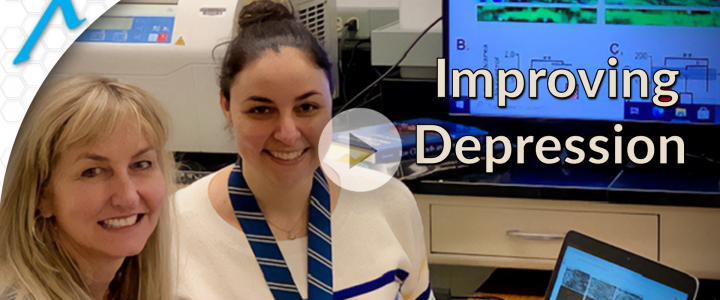
Did you know that depression is more common in those with autism and/or Fragile X? Even more disturbing is the discovery that current treatments for depression do not work in Fragile X mice. With this grant, the team will work to develop a rapid screening tool to identify FDA-approved drugs which can treat depression in people with Fragile X syndrome.
Read moreHow FRAXA Prioritizes Research, Explained

Dr. Mike Tranfaglia explains how FRAXA prioritizes research and the importance of looking at research from multiple angles. “It’s not either-or. It’s not we have a definitive treatment or we have a new drug treatment or we have a repurposing treatment. We can have all of those things, mixed or matched, in a personalized medicine kind of way and I think that’s what we’re headed for.”
Read moreWhat FRAXA Is Excited about in the Upcoming Fragile X Research Grants, Explained

Dr. Mike Tranfaglia shares what FRAXA is excited about as we work through reviewing all of the submitted Fragile X research grant applications. We find it especially exciting that so many new clinical trials are starting right now, as our major emphasis is getting the drugs and other treatment strategies that we have tested in the Fragile X mouse model to patients in clinical trials.
Read moreNew Fragile X Clinical Trial Announced by Healx

Healx’s AI-driven approach makes finding the right combination therapies more efficient, cost-effective, and rapidly ready for testing at FRAXA-DVI. It was this process that has brought Healx to its recent announcement sharing that it has received Investigational New Drug (IND) approval from the US Food and Drug Administration (FDA) for the Phase 2a clinical study of HLX-0201 (sulindac, an FDA-approved drug).
Read morePurposeful and FRAXA Partnership Leads to Clinical Trial
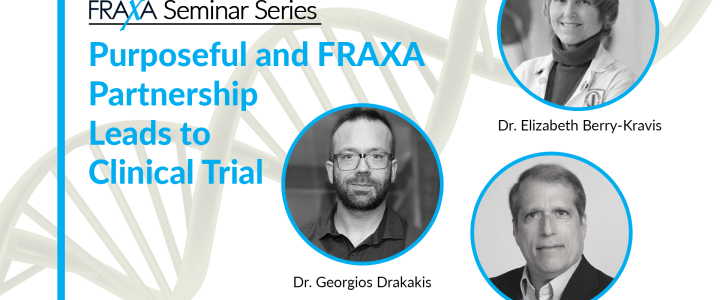
Can a combination of drugs make a meaningful difference for people with Fragile X? A new clinical trial is going to find out. 15-20 adult men with Fragile X will be included in this trial to test the effects of an available drug and a nutritional supplement taken together.
Read more2021 Fragile X Research Grants Funded by FRAXA Research Foundation
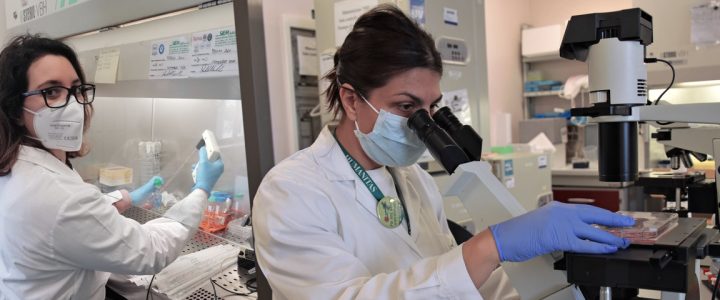
Each year, FRAXA funds a diverse portfolio of research. Our FRAXA Fellowships are seed funding for the future, the feedstock for the Fragile X treatment development pathway. While we are looking to promote as many promising new approaches as possible, prominent themes emerge each year, as scientists around the world tackle previously neglected areas.
Read moreExploring Drug Repurposing to Restore Hippocampal Function in FXS Mouse Models
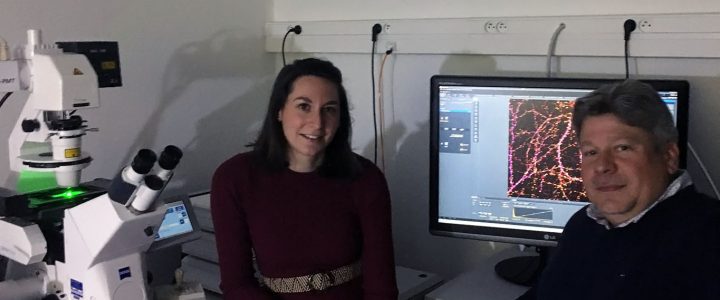
A gene’s job is to produce a protein. In Fragile X syndrome, the FMR1 gene is mutated and cannot make FMRP, a protein which shapes connections between nerve cells (neurons) in the brain. These connections are the basis of learning and memory. This team has discovered a mechanism involving FMRP that is absolutely essential to control the connections between neurons. These connections are the basis of learning and memory. They will now test available drugs which directly target this mechanism, to see if they can treat Fragile X syndrome.
Read moreFRAXA Drug Validation Initiative (FRAXA-DVI)

The FRAXA Drug Validation Initiative (FRAXA-DVI) provides speedy, cost-effective, objective preclinical testing of potential Fragile X treatments. FRAXA-DVI uses in-vitro systems, behavior batteries, and gene expression and peripheral biomarker platforms to validate investigational new drugs and repurposed available compounds in Fragile X syndrome (FXS).
Read moreBeneath the Surface of Fragile X Syndrome: Study Sheds Light on What’s Happening in Nerve Cells

This FRAXA-funded project has turned up some surprising results. At first, it might seem Kurosaki and Maquat have found yet another cellular process which is malfunctioning in Fragile X. But this finding is intimately related to previous findings of abnormal protein synthesis and misregulated transcription in Fragile X. FMRP (the protein lacking in Fragile X syndrome) is involved in chaperoning messenger RNAs within cells to active sites, and in controlling their translation into many different proteins. Some of these proteins are transcription factors, which feed back to the nucleus to control gene expression.
Read moreHealx Drug Repurposing Programme for Fragile X Syndrome
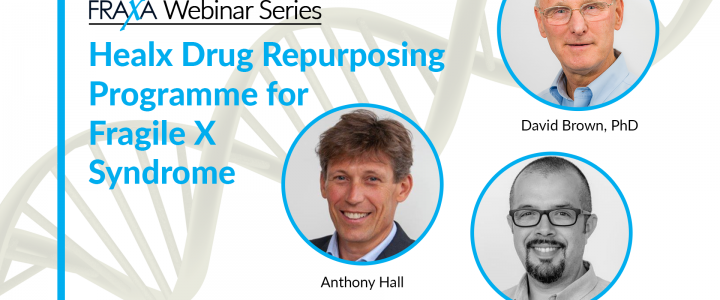
David Brown, MD, PhD, Ivan Angulo-Herrera, PhD and Anthony Hall of Healx present about the Drug Repurposing Programme for Fragile X syndrome.
Read moreMechanisms and Biomarkers of Sensory Hypersensitivity in the fmr1 Knockout Mouse
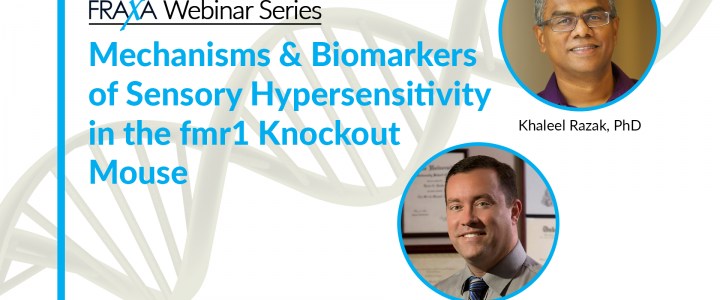
In this Fragile X research webinar we hear from Devin K. Binder, MD, PhD, Professor, University of California at Riverside Medical School and Khaleel Razak, PhD, Professor, University of California at Riverside as they present about Mechanisms and Biomarkers of Sensory Hypersensitivity in the fmr1 Knockout Mouse.
Read moreAripiprazole (Abilify) in the Treatment of People with Fragile X: An Anecdotal Account

The aim of this article is to discuss the use of Abilify (generic name: aripiprazole) as a treatment for people with Fragile X syndrome (FXS). As an “off-label” prescription, Abilify targets behaviors such as irritability, aggression, self-injury and severe tantrums.
Read moreBrain Organoids and Therapeutic Development for Fragile X and Other Rare Diseases
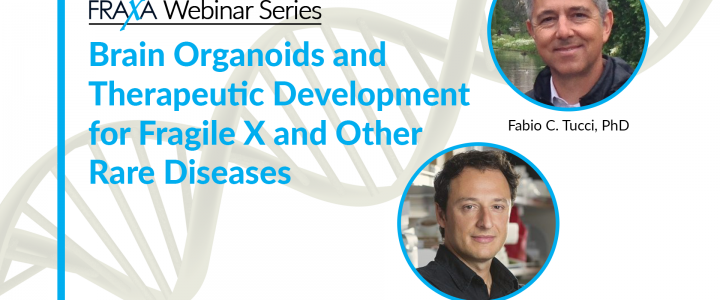
This is the first in a series of webinars focused on current topics in Fragile X research. In this webinar we hear from Alysson R. Muotri, PhD, Professor at University of California San Diego Stem Cell Programand Fabio C. Tucci, PhD, Chief Operating Officer and co-founder at Epigen Biosciences, Inc.
Read moreDrug Repurposing for Rare Disease and the Future of Health – The Genetics Podcast

In this double-bill episode of The Genetics Podcast, Dr. Patrick Short talks to two key rare disease researchers in the field: Dr. Bruce Bloom, CCO of Healx, and Dr. Mike Tranfaglia, CSO of FRAXA. Both draw on their wide-ranging personal and professional experiences to discuss the successes and opportunities of drug repurposing, the power of using machine learning, and the work they’ve been doing to aid in finding effective treatments for Fragile X.
Read moreConsidering Available Drugs for Fragile X: My Favorite Combination (So Far)
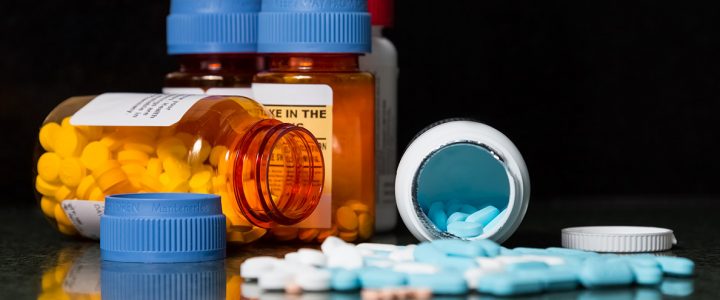
Which of the available drugs are best for fragile X? We tend to think of drugs according to their primary activity in the body, but very few drugs are totally selective and specific. There are differences between drugs in any given class, and these differences may be critical. Most drugs have “off-target” effects which are usually considered side effects, and it is these side effects which can have key advantages, in some cases.
Read moreNew Partners Aim to Accelerate the Discovery and Repurposing of Medicines for Rare Neurological Diseases

First Healx secured $56M in new financing to launch a global Rare Treatment Accelerator program to tackle Fragile X syndrome and 39 other rare diseases. Now they have built a partnership with Boehringer Ingelheim worth millions. It all started with a small FRAXA grant to Healx to repurpose available drugs for Fragile X.
Read moreHealx Raises $56M to use AI to Find Treatments for Fragile X & Other Rare Diseases
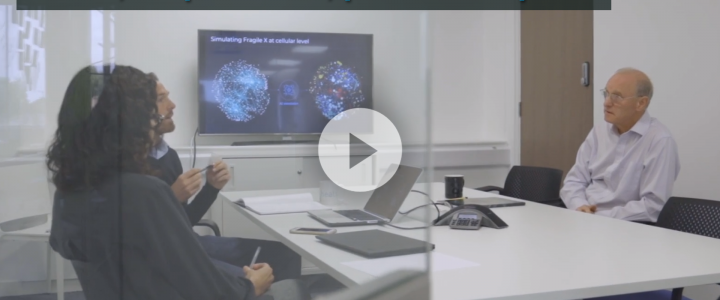
Healx has secured $56M in new financing to build a clinical-stage portfolio for rare diseases, including treatments for Fragile X syndrome, and to launch a global Rare Treatment Accelerator program. Where the traditional drug discovery model takes more than a decade and can run into the billions of dollars, Healx’s AI-driven approach makes the process faster, more efficient and cost-effective.
Read moreScreening 2,320 FDA-Approved Drugs for Potential Treatment of Fragile X

FRAXA Research Foundation has awarded a $90,000 grant to Principal Investigator Dr. Sean McBride and Postdoctoral Fellow Dr. Karen Joyce, at Rowan University, to screen all 2,320 FDA-approved drugs on both mouse and fly models of Fragile X syndrome. Those drugs which show promise will be tested in more detail for potential to treat Fragile X in humans.
Read moreTakeaways from Fragile X Advocacy Day

In the first week of March I attended my first Fragile X Advocacy Day to meet with many of the Massachusetts delegation to Congress. While this was my first time advocating for Fragile X research, I’ve been a longtime lung cancer research advocate and have met with many of the same representatives in the past. It was a pleasure to meet with many of the families as my participation in Advocacy Day was in the spirit of “we are all in this together”.
Read moreRepurposing Study II: Evaluating Combinations of Drugs to Treat Fragile X

FRAXA Research Foundation initially partnered with Healx in 2016 to identify existing drugs with potential to treat Fragile X syndrome, using machine learning algorithms and computational biology. The study produced results, and now FRAXA and Healx have launched a new round of studies to evaluate combinations of compounds, including both drugs and natural products.
Read more
